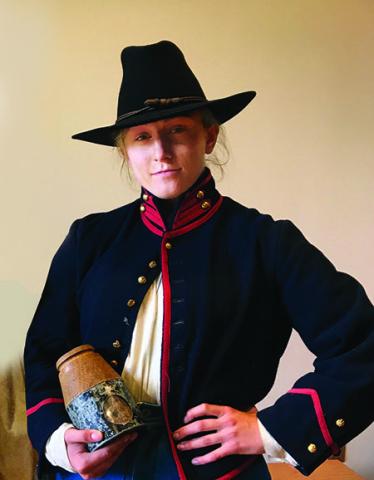Student Brings History to Life
Leah Baer ’19 spent the summer as an interpreter at Gettysburg.
For her summer internship, Leah Baer ’19 experienced history firsthand at Gettysburg National Military Park. Working as an interpreter, sometimes dressed in period costume, the history major facilitated connections to the historic landscape for visitors. But for the much-anticipated anniversary of the Battle of Gettysburg, she appeared as a Union soldier.
Why this particular internship?
In the summer, Gettysburg receives approximately 1,000 visitors per day. I wanted to help people comprehend the complex and tumultuous events that occurred here and how the universal themes embedded in the battle resonate today. With this internship, I got to apply all the skills I acquired as a history major on a grand scale.
What was your part in the battle anniversary?
Thousands of people come to Gettysburg on the first three days of July to partake in programs that delve into the campaign and battle. For the anniversary, I depicted German immigrant Lieutenant Colonel Frederick Füger of Battery A, 4th U.S. Artillery. I had to write an outline about his accomplishments during the battle.
In the beginning of the internship, I developed a Third Day Program about Pickett’s Charge and its role in the battle and overall war, which I presented to the public a couple of times per week. I centered my theme around the role of immigrant soldiers in the Union Army and their pivotal role in helping General George Meade achieve victory.
When conducting research about immigrants in the Union Army, I stumbled across Füger's story. I was fascinated by him, so when he opportunity arose to portray a figure from the battle, I jumped at the chance.
What did Füger do at Gettysburg?
When his commanding officer was killed during Pickett’s Charge, Füger assumed command. He directed battery fire and then fought hand-to-hand to drive the Confederates back to Seminary Ridge. For his actions, he was awarded the Medal of Honor. Overall during the war, he was present at 63 battles and skirmishes.
What was your favorite part of the internship?
The children’s program! Called Join the Army, it explains what the typical soldier experienced and also teaches children some commands and lets them wear Union kepis, a French-style infantry cap. The children are so inquisitive about Gettysburg and the soldiers who fought there. And when they are allowed to participate and mimic what we’ve told them, they absorb everything.
What’s next for you?
Now in my junior year, I’m taking classes that focus on American history while also exploring other areas. Next year, I plan to write a thesis, possibly on some heavily immigrant Philadelphia regiments, such as the 69th Pennsylvania Volunteers, which was made up of mostly Irishmen. Then, I plan to attend graduate school for a master’s degree in public history. If I choose to work for the Park Service, this path will help me maneuver my way through the institution.
Published on: 12/18/2017
